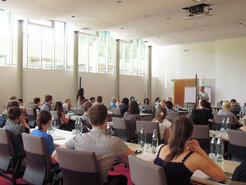Max Planck UCL Centre for Computational Psychiatry and Ageing Research
Directors

Raymond J. Dolan (University College London, London, UK)
Ulman Lindenberger (MPI for Human Development, Berlin, Germany)
Deputy Directors
Arno Villringer (MPI for Cognitive and Brain Sciences, Leipzig, Germany)
Quentin Huys (University College London, London, UK)
Research Scientists (Berlin Site)
Andreas M. Brandmaier
Douglas D. Garrett
Simone Kühn
Ulman Lindenberger
Nicolas W. Schuck
Overview
The behavioral neurosciences and related disciplines have seen spectacular scientific advances that make them rich in scientific opportunity. These advances have made it possible to work toward a mechanistic understanding of behavioral aging and psychopathology, two empirically overlapping fields of great importance to science and society. In both fields, it is key to take a personalized lifespan approach by identifying neural and behavioral parameters that predict more or less favorable trajectories, with the intent to intervene in time when undesirable outcomes are expected.

Plenary Session at the Fifth Symposium and Advanced Course on Computational Psychiatry and Ageing Research, Schloss Marbach, September 2022. The event focused on childhood memory development, and was organized in collaboration with the Jacobs Foundation.
With these goals in mind, the Max Planck Society and University College London (UCL) established the Max Planck UCL Centre for Computational Psychiatry and Ageing Research in 2014, with both partners providing an initial 5 years of funding. In 2018, the Centre was positively evaluated by the Max Planck Society and extended for another 5 years (2019–2024). The Centre has two sites, one in London (Russell Square) and the other in Berlin-Dahlem at the MPI for Human Development (see Table 1). It has continued to grow both in scope and number of students. Combined across Berlin and London sites, the Centre currently comprises 77 members (faculty, fellows, and students).
The Centre’s foundation was preceded by a 3-year preparatory phase, which also included the organization of the First Symposium and Advanced Course on Computational Psychiatry and Ageing Research in 2012 at Ringberg Castle, Bavaria. During the reporting period, the Centre organized the fifth symposium of this kind in 2022 at Schloss Marbach (see photos); the symposium in 2020 had to be cancelled because of the COVID-19 pandemic.
In 2016, the Centre launched the International Max Planck Research School on Computational Methods in Psychiatry and Ageing Research (COMP2PSYCH) to extend its reach into graduate education. After a successful evaluation in September 2020, the graduate program of the Centre was extended for a second 6-year term until September 30, 2028.
Research Groups
Three MPIB research groups form the Centre in Berlin:
- The Formal Methods in Lifespan Psychology project, led by Andreas Brandmaier at the Center for Lifespan Psychology (LIP);
- The Emmy Noether Group, The Lifespan Neural Dynamics Group (LNDG), led by Douglas D. Garrett (also affiliated with LIP);
- The Max Planck Research Group Neural and Computational Basis of Learning, Decision Making and Memory (MPRG NeuroCode), led by Nicolas Schuck.
In London, six research groups form the basis of the Centre:
- The Affective Brain Group, led by Tali Sharot;
- The Applied Computational Psychiatry Group, led by Quentin Huys;
- The Developmental Computational Psychiatry Group, led by Tobias Hauser;
- The Learning Memory & Decision Lab, led by G. Elliott Wimmer;
- The Metacognition and Computational Psychiatry Group, led by Steve Fleming; and
- The Reward, Decision Making and Psychopathology Group, led by Ray Dolan.
A full overview of the Centre’s activities can be found on the Centre’s website.
Collaborations

After-dinner impressions from the Fifth Symposium and Advanced Course on Computational Psychiatry and Ageing Research, Schloss Marbach, September 2022. From left to right: Chi (Zoe) Ngo, Ulman Lindenberger, Sarah Power, Ann-Kathrin Jöchner, Elisa Buchberger, Erika Stewart (Trinity College Dublin), Leonhard Waschke.
Leveraging the unique skill and interest set at each site, a number of collaborations between the Berlin and London Centre sites continue to develop. For example, the Lifespan Neural Dynamics Group (PI Douglas Garrett) collaborates with the Developmental Psychiatry Group (PI Tobias Hauser) on the behavioral and neural bases of explore–exploit decision making across the lifespan, and with the Metacognition and Computational Psychiatry Group (PI Steve Fleming) on the connections between behavioral and neural uncertainty. Further, the MPRG NeuroCode (PI Nicolas Schuck) is collaborating with the Applied Computational Psychiatry Group (PI Quentin Huys) on a project to investigate mind wandering in healthy subjects vs. depressed patients using fMRI decoding techniques, and has co-authored a review about decoding cognition from spontaneous neural activity with the Dolan group (Liu et al., 2022). Also, a cross-site, in-depth workshop on “Data management with DataLad” was organized by MPRG NeuroCode member Lennart Wittkuhn in November 2020. The workshop centered around DataLad, an open-source software tool for data management and data publication. Participants learned about core concepts of effective research data management, such as joint version control of code and data, provenance capture for reproducible analysis, organizational principles for data analysis, and workflows and services for data publication and collaboration.
Table 1. Max Planck UCL Centre Members* at the MPIB (as of 03/2023)
| Name | Center/Research Group | Position |
|---|---|---|
| Andreas Brandmaier | Lifespan Psychology | Group Leader |
| Simon Ciranka | Adaptive Rationality | Postdoc |
| Douglas D. Garrett | Lifespan Neural Dynamics Group & Lifespan Psychology | Group Leader |
| Shany Grossman | Max Planck Research Group NeuroCode | Postdoc |
| Sam Hall-Macmaster | Max Planck Research Group NeuroCode | Postdoc |
| Simone Kühn | Lise Meitner Group for Environmental Neuroscience | Group Leader |
| Ulman Lindenberger | Lifespan Psychology | Director |
| Nicolas W. Schuck | Max Planck Research Group NeuroCode | Group Leader |
| Leonhard Waschke | Lifespan Neural Dynamics Group & Lifespan Psychology | Postdoc |
| Lennart Wittkuhn | Max Planck Research Group NeuroCode | Postdoc |
| Ondrej Zika | Max Planck Research Group NeuroCode | Postdoc |
* For doctoral students, see IMPRS COMP2PSYCH.
Note that Simon Ciranka and Lennart Wittkuhn are COMP2PSYCH alumni, that is, they completed their graduate training within COMP2PSYCH.


